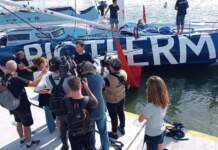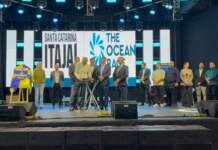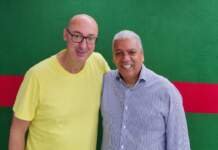 Knut Frostad is bowing out after eight years running the Volvo Ocean Race as CEO. Monday is his last day and in one final interview, he talks through what gave him most sleepless nights at the helm of offshore sailing’s leading race, his biggest decision, and his thoughts about the future of thesport.
Knut Frostad is bowing out after eight years running the Volvo Ocean Race as CEO. Monday is his last day and in one final interview, he talks through what gave him most sleepless nights at the helm of offshore sailing’s leading race, his biggest decision, and his thoughts about the future of thesport.
Special: Jon Bramley,
Volvo Ocean Race
Post – 8/2-11:44
Knut – after eight years at the helm, there seems to be a sense of inevitability about your rise from four-time Volvo Ocean Race sailor to CEO, but tell us a little about how you got the job in the first place? I understand it came out of the blue?
KF: From my side it did. I had started a company in Scandinavia and I was doing one of my last sailing stunts, which was more of a cruising regatta. In the middle of the Atlantic I got a call from Volvo and they asked if I were interested in the job.
I had all my old Volvo Ocean Race crew with me, with Roger Nilson navigating, and I was in the Volvo mood again. I hadn’t honestly thought about the role before then, but the more I did the more I realised it was the perfect job.
I had to have some conversations with my wife-to-be to see if she was willing to come to England (where the Volvo Ocean Race was then based) with me.
What were your first big challenges and your initial vision for the Race in 2008?
KF: When I started there was a sense at the Race of short-term planning. Everything was done race by race. The 2008-09 Race, which was my first to manage, was only announced at the finish of the previous race and that was how things were done. Things had very short lead times which made it pretty challenging.
When I started in March that year we didn’t even have all the stopovers in place – we didn’t have one in Sweden nor in America. Plus there were some teams that we thought were funded which weren’t financed so we had some pretty hairy big fixes to make before that start.
My vision was to lift the quality and the overall professionalism of the event. I also had a focus on organising the race in a long-term, strategic way. It had always been organised race by race and that’s nothing out of the ordinary in the sport – it was always done race by race or cup by cup. And that made things very difficult to build for the long term. You have to have a long-term vision.




















